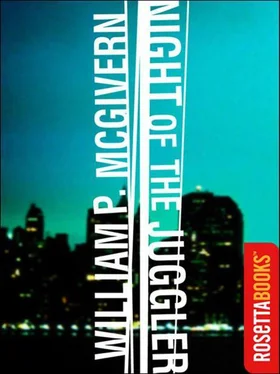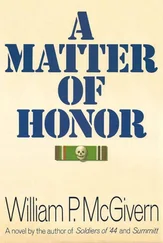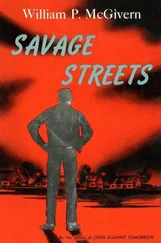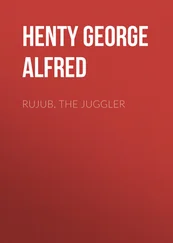William McGivern - Night of the Juggler
Здесь есть возможность читать онлайн «William McGivern - Night of the Juggler» весь текст электронной книги совершенно бесплатно (целиком полную версию без сокращений). В некоторых случаях можно слушать аудио, скачать через торрент в формате fb2 и присутствует краткое содержание. Жанр: Триллер, на английском языке. Описание произведения, (предисловие) а так же отзывы посетителей доступны на портале библиотеки ЛибКат.
- Название:Night of the Juggler
- Автор:
- Жанр:
- Год:неизвестен
- ISBN:нет данных
- Рейтинг книги:3 / 5. Голосов: 1
-
Избранное:Добавить в избранное
- Отзывы:
-
Ваша оценка:
- 60
- 1
- 2
- 3
- 4
- 5
Night of the Juggler: краткое содержание, описание и аннотация
Предлагаем к чтению аннотацию, описание, краткое содержание или предисловие (зависит от того, что написал сам автор книги «Night of the Juggler»). Если вы не нашли необходимую информацию о книге — напишите в комментариях, мы постараемся отыскать её.
Night of the Juggler — читать онлайн бесплатно полную книгу (весь текст) целиком
Ниже представлен текст книги, разбитый по страницам. Система сохранения места последней прочитанной страницы, позволяет с удобством читать онлайн бесплатно книгу «Night of the Juggler», без необходимости каждый раз заново искать на чём Вы остановились. Поставьте закладку, и сможете в любой момент перейти на страницу, на которой закончили чтение.
Интервал:
Закладка:
But Lieutenant Tonnelli had stubbornly continued to press for manpower and resources to prevent the Juggler from making it four in a row. The raping and mutilation of those tender young bodies had become a consuming obsession with the Gypsy.
At first he hadn’t understood this compulsion. Couldn’t understand why he was knocking on official doors, aggravating his superiors, indulging an almost always fatal professional flaw which was, in effect, a distrust of the department and the corollary conviction that he was the only man who could get the job done. Gypsy Tonnelli in a mano amano against the Juggler, not the city’s thirty thousand cops acting in impersonal concert to trap a killer.
Later he understood his compulsion, but that served only to make it more bitter and relentless.
On one occasion Tonnelli had recklessly driven to Camden, New Jersey, to seek out the New York commissioner of police, who was in that city to speak to a group of the nation’s top law enforcement officers. (The commissioner’s topic was kinky and typical of him: He advocated that bachelors, not having the responsibility of wives and families, should be drafted as reserve police officers certain given hours per month.)
Tonnelli had found the commissioner in his hotel room and had pleaded with him for a special force to stop the Juggler. The commissioner had been impressed by the Gypsy’s zeal but mildly exasperated by the interruption, since at the time he had been putting the finishing touches on his speech. The commissioner’s “mild exasperation” had picked up velocity and strength as it raced back down the channels of the department, and this had ultimately struck Tonnelli like a gale force tornado.
He hadn’t been suspended but had been threatened with that action.
Then Jenny Goldman had been murdered on October 15. And Tonnelli picked up an ally strong enough to break the power of any police department in the free world, said ally being the aroused, challenging, accusing national and international press. And since Tonnelli now had a physical make of sorts on the Juggler, Deputy Chief of Detectives Greene had called the Gypsy into his office one sweltering afternoon in August. “Bunch of goddamn vultures,” the chief had said. “Headlines calling us incompetent because we can’t find a needle in a haystack.”
“You could turn that around, Chief,” the Gypsy had said. “Problem is, we’ve got a million needles in our particular haystack. The job is finding the right one.”
“So what do you want?”
“Two units. One under Rusty Boyle’s command. The other under mine.”
“What kind of troops you talking about?”
“Sixteen second-or third-grade detectives.”
“I’ll give you eight. What else?”
“Reserves of uniformed troops I won’t commit unless we go to a Red Alert. Dispatchers, a few bird cops to handle the paper.”
The chief made notes. “And?”
“On October 8, I want helicopters standing by, attack-trained dogs, light trucks, and a team of marksmen.”
“For Christ’s sake, Gypsy, you sound like you’re going to start a goddamn war.”
“I hope I’m gonna end one.”
Lieutenant Tonnelli and Detective Sergeant Rusty Boyle had selected their staff with extreme care, dipping into precincts in all five boroughs of the city to find the men they needed. What they had to do in the lead time represented by August and September was to redevelop complete biographies of the four dead girls, with a renewed attempt to determine whether or not the victims had traits or flaws in common which appealed to the Juggler’s sadistic needs.
This all had been done before, of course, but by detectives normally and routinely assigned to the task by the department’s table of organization. Now all that mass of official reports would be reworked by a special unit honed and chiseled in advance to stop the Juggler.
Thus, the men Tonnelli and Boyle had selected were chosen for their tact and understanding, in addition to their rigorous efficiency as investigative officers. They must interview once again the parents and relatives of the four dead girls. And this must be done without unduly lacerating the emotions of grieving fathers and mothers. This was not only basic, decent humanity, but it would also help create an almost confessional climate that would allow the parents to re-create the activities and patterns of their children’s lives as accurately as possible.
Detective Second Grade Miles Tebbet in Sergeant Rusty Boyle’s unit had studied for the priesthood until he realized his vocation was not a true one, and at this time he had joined the New York police department. He was twenty-eight, a slender blond who usually wore jeans and a poncho, and was about the best man on the force to talk down a jumper.
Second Grade Detective Clem Scott in Tonnelli’s unit had a bachelor’s degree in urban affairs from Fordham University. Scott was married, with two children, and spent one day a month at a VA hospital typing personal letters for disabled veterans.
The remainder of the units were men of similar bents and endowments. While some were more educated than the others, they shared one thing in common. They were, in Tonnelli’s view, a group that represented the toughest and most dedicated traditions and skills of the department. They were expert marksmen, and Tonnelli knew from their records that they had guts; damned fine men to be at your side if you were going into an alley after a killer.
Carmine Garbalotto, in Tonnelli’s unit, was a veteran of eighteen years on the force, who lived in Brooklyn with a wife and nine children. He was an expert in the areas of perversion and child molestation; he could check a crowded playground at a glance and determine whether it was “clean” or not. Garbalotto’s specialty was movie theaters; his big hand had fallen heavily on the shoulders of hundreds of men he had observed attempting to molest young boys or girls, whose attention was so riveted by what John Wayne or Doris Day might be doing up on the big screen that they were hardly aware of the fingertips probing toward their loins.
Tonnelli and Boyle’s units had processed every sex crime committed in all five boroughs of the city during the past five years, using these profiles as the base of their investigative mosaic. But none matched the Juggler’s MO.
In September, Tonnelli had dispatched Detectives Tebbet and Scott to the morgue of the New York Times to check news stories on October 15 on the years before the murders had commenced their crimson flow through the borough of Manhattan. They were looking for stories which might have triggered a need for revenge: massive lawsuits, bitter, expensive divorces, medical malpractice suits, tragic accidents, suicides, something bizarre or catastrophic that could send someone around the bend, misfortune driving a victim toward a series of paranoid slaughters. Tebbet and Scott had indeed found catalogues of disaster in every edition of the Times published on October 15 in the five years before the Libra murders: rapes, drownings, explosions, hit-run victims, murders by ice pick and fine nylon stockings. But the sheer number and variety of tragedies had been so massively complex and unrelated that the precious hours given to the project had ultimately been unproductive, a sheer waste of time.
Libra-September 24 to October 23. All the murders had occurred on Libra 15. Something dark and hidden and mystical in the mysterious signs of the zodiac, like the movement of a leviathan in fathomless waters, appealed powerfully to the Gypsy’s Sicilian intuitions. But none of the victims had been Libras. Encarna Garcia, Gemini. Trixie Atkins, Aquarius. Bonnie Jean Howell, Capricorn, and Jenny Goldman, Scorpio.
Gypsy Tonnelli wondered at the possible significance of the symbol of Libra, the classic golden scales. Did that suggest a perverted sense of justice or retribution? Or the sinister balance between himself and the man they called the Juggler. . But so far, with all their research, with all the potentials they had explored, with so much talent and dedication going for them, Tonnelli’s task force had come up dry, had drawn blanks.
Читать дальшеИнтервал:
Закладка:
Похожие книги на «Night of the Juggler»
Представляем Вашему вниманию похожие книги на «Night of the Juggler» списком для выбора. Мы отобрали схожую по названию и смыслу литературу в надежде предоставить читателям больше вариантов отыскать новые, интересные, ещё непрочитанные произведения.
Обсуждение, отзывы о книге «Night of the Juggler» и просто собственные мнения читателей. Оставьте ваши комментарии, напишите, что Вы думаете о произведении, его смысле или главных героях. Укажите что конкретно понравилось, а что нет, и почему Вы так считаете.












